뉴스&스피킹(영자신문)
하루 10분이면 영어에 대한 두려움을 극복하고 누구나 유창하게 영어를 구사하실 수 있습니다.
-
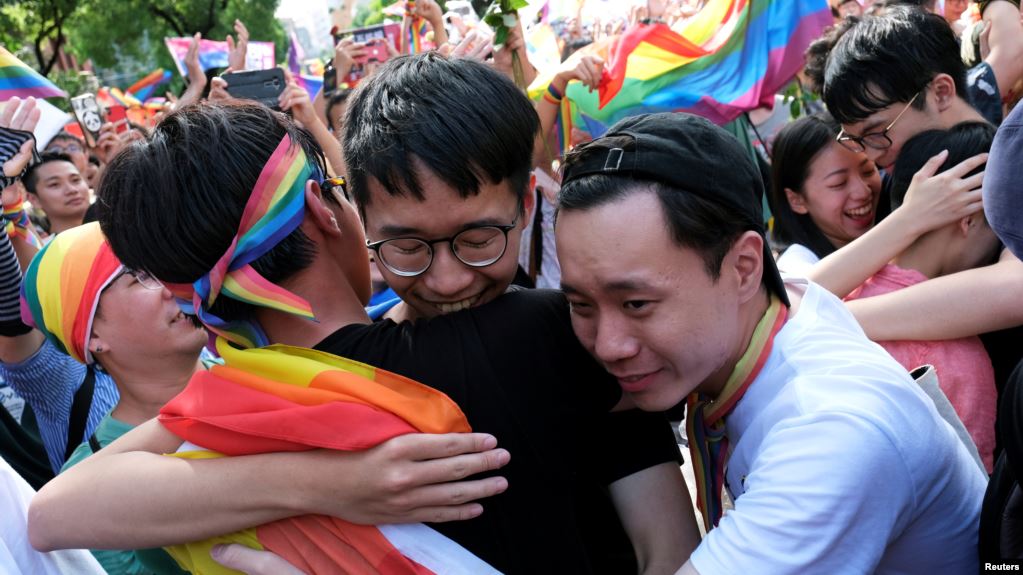 Taiwan Approves Same-Sex Marriage in First for Asia Taiwan’s legislature voted Friday to legalize same-sex marriage. It became the first country in Asia to recognize the rights of same-sex couples.
Taiwan Approves Same-Sex Marriage in First for Asia Taiwan’s legislature voted Friday to legalize same-sex marriage. It became the first country in Asia to recognize the rights of same-sex couples.
The new legislation gives couples many of the tax, health insurance and child care rights available to male-female married couples.
Before the vote, Taiwanese lawmakers were under pressure from two sides: gayactivists and religious groups opposed to the measure.
Taiwanese President Tsai Ing-wen supported the same-sex marriage bill. She wrote: “On May 17th, 2019 in Taiwan, Love Won. We took a big step toward true equality, and made Taiwan a better country.” Her comments appeared on the American news and social media service Twitter.
“It’s a breakthrough, I have to say so,” said Shiau Hong-chi. He is a professor of gender studies and communications management at Shih-Hsin University in Taiwan.
Thousands of people demonstrated Friday morning in the rainy streets outside the parliament building before the vote. Many protesters carried signs reading “The vote cannot fail.” About 50 opponents sat nearby and gave speeches in support of marriage between only men and women.
Taiwan’s Constitutional Court ruled in May 2017 that the constitution permits same-sex marriages. The court gave parliament two years to amend the island’s marriage laws.
The court order got gay rights groups pushing for fair treatment. It also increased activism by Christian groups and supporters of traditional Chinese family values. They note the importance of marriage and producing children.
The first same-sex marriage law in Asia
Religion, conservative values and political systems that discourage gay activism have slowed moves toward same-sex marriage in many Asian countries. However, Thailand is exploring the legalization of same-sex civil partnerships.
“This will help (fuel a) debate in Thailand, and hopefully will help Thailand move faster on our own partnership bill,” said Wattana Keiangpa of the Asia Pacific Coalition on Male Sexual Health.
Phil Robertson is the deputy Asia director for Human Rights Watch. He said Taiwan’s actions should kick “off a larger movement across Asia to ensure equality.”
Taiwan’s acceptance of gay relationships began in the 1990s. That is when leaders of the Democratic Progressive Party supported the cause to help Taiwan stand out in Asia as an open society.
Taiwan is a self-governing democracy with a strong civil society. The island’s political system supports rights for sexual and ethnic minorities, women, and others.
Yet mainland China claims the island as part of its territory. The mainland is under the control of the Chinese Communist Party. Party officials have repeatedly discouraged even the discussion of legalizing same-sex marriage.
News of Taiwan’s new law, however, was a popular issue on social media in China. The Twitter-like website Weibo had more than 100 million views.
Continued opposition
Opponents in Taiwan raised fears of insurance scams and children confused by having two mothers or two fathers. Both sides of the issue have held colorful street demonstrations and tried to influence lawmakers.
“This is going to cause a lot of morality problems,” said Lin Shih-min. He is with the Taiwan political action group Stability of Power, which opposed the law. “Children…have the right to grow up with both a mother and a father,” he said.
In November of 2018, a majority of Taiwanese voters rejected same-sex marriage in a special referendum. However, legislators supported the idea and voted separately on each item largely along party lines. They said it followed the law as well as the spirit of the island-wide vote.
“We need to take responsibility for the referendum last year and we need to take responsibility for people who have suffered from incomplete laws or faced discrimination,” said Hsiao Bi-khim, a ruling party legislator. She spoke during the three-hour parliament meeting.
At least 20 same-sex couples are planning a mass marriage registration in Taipei on May 24, said a representative of the group Marriage Equality Coalition Taiwan. They will hold a large gathering the next day on a street outside the presidential office, the organizer said.
The law will help Jay Lin and his partner. They want to marry and be joint parents of their two 2-year-old sons. They plan to register for a marriage permit after May 24.
“A lot of gay parents are excited about that already,” said Lin, a Taipei-based technology worker.
I’m Susan Shand.View -
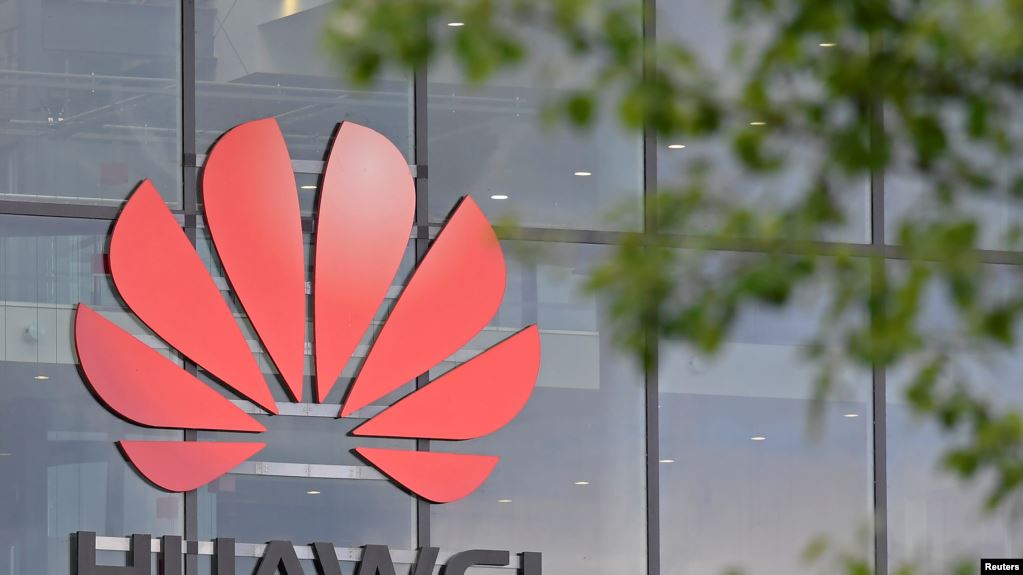 Huawei's $105 Billion Business at Risk after Effective US Ban The United States has effectively banned the Chinese company Huawei from building next-generation, or 5G, mobile communications networks in the country.
Huawei's $105 Billion Business at Risk after Effective US Ban The United States has effectively banned the Chinese company Huawei from building next-generation, or 5G, mobile communications networks in the country.
U.S. officials say Huawei will give information it collects to the Chinese government. They are warning other countries that the company is a national security risk.
U.S. officials have also put rules in place for American companies that export products to Huawei.
International technology companies are worried about the effects of these moves on the technology industry.
In Beijing, a Chinese Commerce Ministry official said,“China will take all necessary measures” to ensure the rights of Chinese companies. Spokesman Gao Feng the United States should avoid actions that may hurt trade talks with China.
The two countries are having a trade war that is partly about a struggle for international economic and technological power.
Reaction to US decision
Some observers say the actions of the Trump administration will likely worsen the already tense situation.
The export restriction puts the possibility “of continued trade negotiations into doubt,” said Eurasia Group experts in a report.
Huawei would be the largest business ever put under export controls. The new rules require Huawei to get U.S. government approval to buy American technology, said Kevin Wolf. He served as assistant secretary of commerce for export administration during the presidency of Barack Obama.
“It’s going to have…effects through the entire global telecommunications network because Huawei affiliates all over the (world) depend on U.S. content," Wolf said. He added that if Huawei and its business partners cannot get the computer software or equipment they need, their operations could collapse.
On Wednesday, U.S. President Donald Trump signed an order that bars American companies from using telecom equipment made by businesses said to be a national security risk.
The president’s executive order does not identify a country or company by name. But it follows months of U.S. complaints about Huawei.
U.S. justice and intelligence officials say China’s economic espionage and the stealing of trade secrets happen all the time. But they have not shown any evidence that any Huawei equipment in the U.S. or elsewhere has been compromised. Huawei denies involvement in Chinese spying.
Legal basis for executive order
The U.S. law used for the order is called the 1977 International Emergency Economic Powers Act. It has never before been used in a way that restricts an entire industry. It has been used mainly to seize the money of drug dealers, terrorists or collapsed corrupt governments.
Huawei is the world’s largest manufacturer of telecommunications equipment. The U.S. government believes that equipment from Chinese companies is a risk to U.S. internet and telecom networks.
For the past 10 years, American officials have warned that using Huawei technology is a national security risk. The company, they say, could use the equipment for espionage on behalf of China.
Huawei warns that preventing it from doing business in the United States would slow down the start of next-generation communications technology.
“We are ready and willing to (talk to) the U.S. government and come up with effective measures to ensure product security,” the company said in a statement.
The restrictions “will not make the U.S. more secure or stronger,” the company said. It said the United States would be limited to low quality, yet more costly, mobile systems.
In a statement, Federal Communications Commission Chairman Ajit Pai called the executive order a “step toward securing America’s networks.”
“It signals to U.S. friends and allies how far Washington is willing to go to block Huawei,” said Adam Segal. He is a cybersecurity director at the U.S. Council on Foreign Relations.
Huawei says it supplies 45 of the world’s top 50 telephone companies. But only about 2 percent of telecom equipment purchased by North American carriers was Huawei-made in 2017.
I’m Jonathan Evans.View -
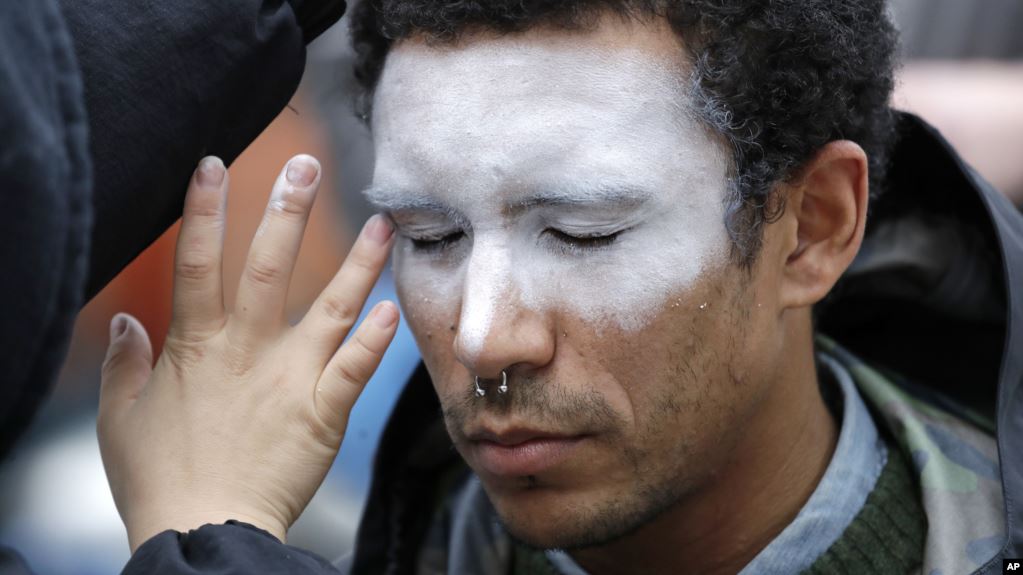 San Francisco First US City to Ban Facial Recognition by Local Police San Francisco officials have approved a ban on the use of facial recognition technology by local law enforcement and agencies.
San Francisco First US City to Ban Facial Recognition by Local Police San Francisco officials have approved a ban on the use of facial recognition technology by local law enforcement and agencies.
The city’s governing Board of Supervisors approved the ban this week. The board is expected to give final approval to the measure during a second vote next week.
If given final approval, the ban would be the first of its kind passed by an American city. The measure bars the use of facial recognition by local police and all other city agencies.
The ban is part of a bill that restricts surveillance technologies. The measure also orders San Francisco agencies to describe any current or future facial recognition activities.
Use of facial recognition technology by government agencies across the U.S. has continually increased over the past 10 years. The machine-learning methods that power the technology have also greatly improved in recent years.
But the systems are not perfect.
Privacy groups supporting the ban argue that facial recognition systems make too many mistakes and can violate personal rights. For example, they say failures of the technology to correctly recognize race could violate a person’s civil rights. Several studies have shown the technology can have difficulties correctly guessing a person’s race.
Opponents of the ban included law enforcement agencies and some technology companies. They say the use of facial recognition systems should be permitted to help police identify and catch criminals. They also argue the technology can be a useful tool to help find lost children or older people.
American technology company Microsoft is one company developing facial recognition. However, it has joined critics in calling for restrictions on use of the technology by government agencies. Microsoft president Brad Smith said last year he saw an urgent need to begin placing limits on the systems to avoid the kind of surveillance state described in George Orwell’s book "1984."
Alvaro Bedoya heads the Center on Privacy and Technology at Georgetown University in Washington. He told the Associated Press he thinks facial recognition “is one of those technologies that people get how creepy it is.”
Bedoya noted that San Francisco is considered the “most technologically advancedcity” in America. A ban on facial recognition systems there could send a warning to other police agencies thinking of trying out the technology, he said.
California state lawmakers are already considering a proposal to ban the use of facial identification technology with police body cameras. And a bill before the U.S. Senate would restrict businesses from using the technology on individuals without their permission.
But Daniel Castro, vice president of the Information Technology and Innovation Foundation, says he is not sure what effect San Francisco’s ban could have nationwide. He said he believes the measure may be too extreme to serve as a general model.
“It might find success in San Francisco, but I will be surprised if it finds success in a lot of other cities,” Castro said.
San Francisco police say they stopped testing face recognition technology in 2017. Spokesman David Stevenson said in a statement that police officials look forward to “developing legislation that addresses the privacy concerns of technology while balancing the public safety concerns of our growing, international city.”
I’m Bryan Lynn.View -
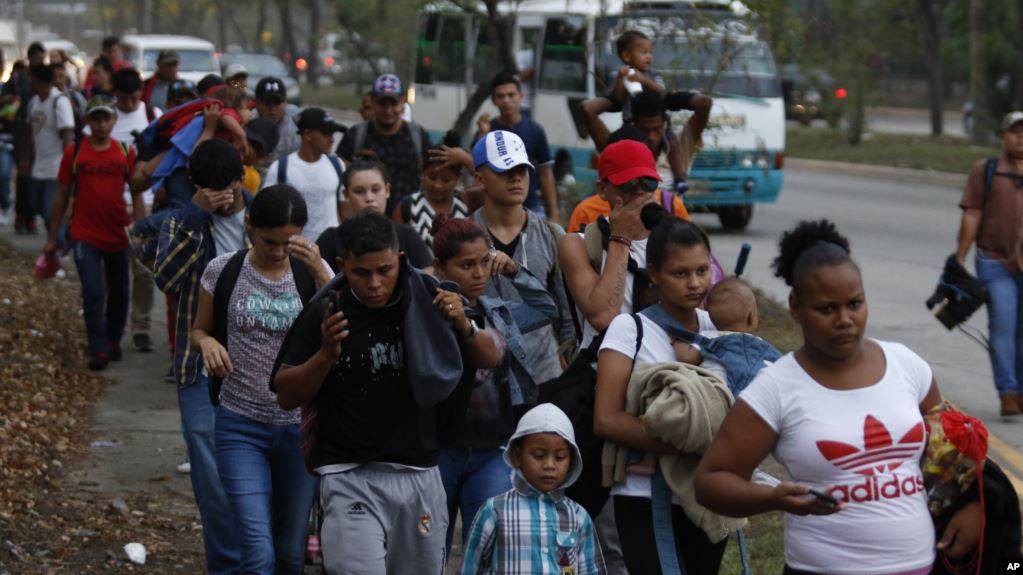 Violence, Poverty Reign in Honduran City There are rules for living in the neighborhoods of San Pedro Sula, Honduras.
Violence, Poverty Reign in Honduran City There are rules for living in the neighborhoods of San Pedro Sula, Honduras.
Everyone knows them: There are places you do not go without permission. When driving, it is best to leave the windows of the car down so gang members can see who is inside. And, it is safest to stay home after dark, leaving the streets to the armed men and drug dealers who kill easily.
Honduras’ second-largest city is where many recent caravans of migrants have formed to head north to Mexico and then to the United States. The people in the caravans are fleeing violence, poverty and corruption.
The northern district of San Pedro Sula is home to nearly 230,000 people. Just 50 police officers watch over its 189 neighborhoods.
The most dangerous neighborhoods are Planeta, Lomas del Carmen and La Rivera Hernandez. Police inspector Wilmer López says he has arrested gang members as young as 9 years old.
Police officers carry handguns, and soldiers armed with assault rifles follow them closely. “They make us feel safer,” López said.
through some of the most dangerous parts of San Pedro Sula.
López said nine different gangs are known to operate in this part of town. They include the well-known 18th Street and Mara Salvatrucha, or MS-13. Both formed more than 20 years ago in Los Angeles, California. They spread to Central America after the United States deported some of their members. The gangs grew into very violent transnational organizations that cause the high death rate and other crimes in Central America’s so-called Northern Triangle — Honduras, El Salvador and Guatemala. They are famous for the bodies and graffiti they leave behind.
On this night, the area is mostly peaceful. Police check identification cards at drinking places. But by 6 in the morning, police find the first body of the day -- just behind the Rivera Hernandez police station.
San Pedro Sula was the world’s most murderous city from 2011 to 2014.
At a small restaurant, news comes on the television that a man at a nearby tire shop has been killed. The man’s body appears on camera. People in the restaurant keep eating.
“People are not shocked when someone gets killed,” said Salvador Nasralla. He is a former opposition presidential candidate.
The National Civil Police say killings have dropped a lot nationally in recent years. In 2011, the rate was 86 killings for every 100,000 people. Last year, the rate was 41 per 100,000 residents. But the country still has one of the highest murder rates in the world.
In San Pedro Sula, some say violence has decreased since about 800 gang members got moved from a prison in the city to a prison in the western mountains. In the first prison, they continued to run their criminal dealings.
People from all over Honduras go to San Pedro Sula whenever a new migrant caravan is about to leave.
Lara is a 27-year-old laborer. He left San Pedro Sula, even though he had a good job there helping build a church. The gangs, he said, were trying to force him and his friends to join.
“They are collecting young people to work for them,” Lara said. He added, “it’s not voluntary, and if you say, ‘No,’ they kill you.”
Many Hondurans blame the country’s problems on President Juan Orlando Hernández. He was re-elected in 2018 even though the country’s constitution bans second terms. Hernandez promised Hondurans a “better life.” But he has been unable to deliver that promise for the country’s poorest and most endangered people.
The United States has threatened the Northern Triangle countries with security and humanitarian aid cuts if they do not stop the caravans of migrants. But, observers say the move could have an opposite effect if jobs and anti-poverty programs suffer.
I’m Susan Shand.View -
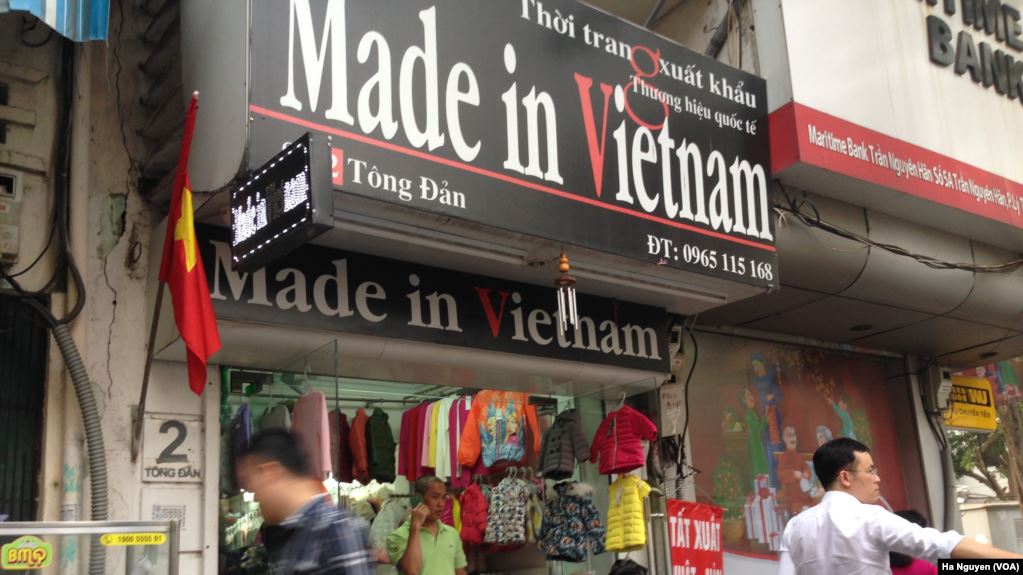 Is It Time for Vietnam’s Companies to Go Overseas? The job of the U.S. ambassador in Hanoi is to represent American interests in Vietnam. Next month, the ambassador will try something new. He plans to take Vietnamese businesses to the United States.
Is It Time for Vietnam’s Companies to Go Overseas? The job of the U.S. ambassador in Hanoi is to represent American interests in Vietnam. Next month, the ambassador will try something new. He plans to take Vietnamese businesses to the United States.
Daniel J. Kritenbrink is the U.S. ambassador to Vietnam. He and his team have been asking Vietnamese companies to send a business group to Washington, D.C.
“Investing in the United States is one of the best decisions that Vietnamese firms can make, especially as the country’s economy continues to…expand,” Kritenbrink said.
Over the past year, U.S. embassy officials have been holding events in Hanoi and Ho Chi Minh City for Vietnamese businesses. Their goal is to persuade the companies to send representatives on the trip, which is planned for June 10 to 12.
The idea for the business delegation comes as Vietnam’s economy is expanding. Many companies are considering if the time has come for them to expand overseas.
For the past 20 years, Vietnam has built a big presence as an export powerhouse. And, as Kritenbrink noted, the United States is the biggest market for those exports.
But many Vietnamese think the country’s businesses should take it to the next step. Instead of just shipping products overseas, they want companies to set up operations and offices around the world.
Some companies have already begun expanding. The electronics business FPT has opened up in Japan and the telecommunications company Viettel is serving markets from Burundi to Peru.
Smaller businesses are also considering the expansion idea. Saigon Innovation Hub, Sihub, announced a program last year to provide support to start-up companies that want to go overseas. The program is named ‘Runway to the World.’
Sihub wants “to gather all local and international resources to realize the…mission of boosting economic growth,” Huynh Kim Tuoc said. He is the managing director of Sihub, which is under the Ho Chi Minh City Department of Science and Technology.
Supporters say international expansion is the next step in the development of businesses in Vietnam. In the 1980s, the Communist government started permitting a market economy to grow.
In the 1990s, the U.S. government lifted its trade restrictions on the country. Vietnam joined the World Trade Organization in the early 2000s. It is now a leading exporter of rice, clothing and telephones to the international market.
Vietnam is still reporting increases in its Gross Domestic Product, foreign direct investment (FDI) and FDI-driven manufacturing.
“We are seeing an increasing number of local electronics players expressing interest to venture overseas for growth," said Standard Chartered Bank official Nirukt Sapru.
But there could be problems.
Some observers worry that the growing trade war between China and the United States could hurt Vietnam’s exports. If China’s economy slows down a lot, Vietnamese exports to that country will fall. Others worry about U.S. President Donald Trump’s other tariff fights with countries like Japan and the European Union.
Vietnamese companies hope that going international will both protect their home economy from foreign trade tensions and help build Vietnam’s national brand.
I’m Susan Shand.View

